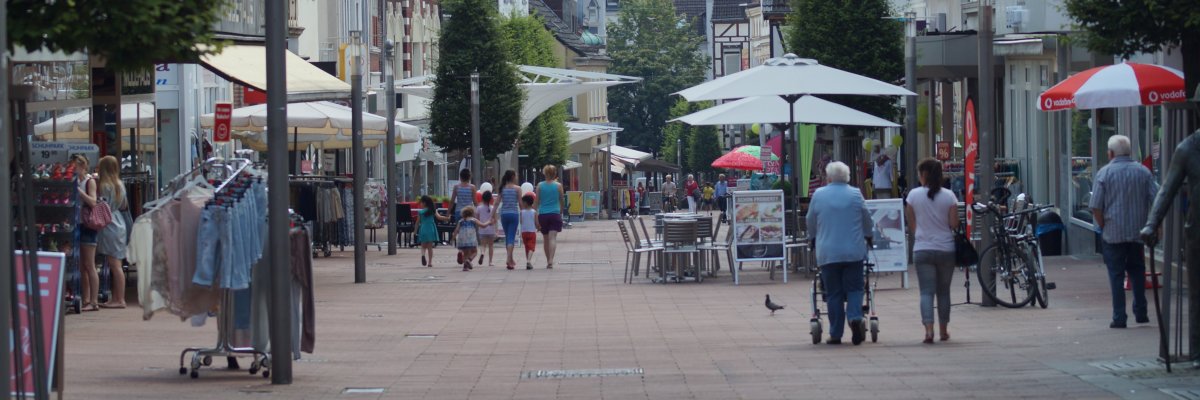Planning for senior citizens
Beckum's planning for senior citizens (until 2023: planning for the elderly) aims to promote reliable and sustainable structures for work with senior citizens and assistance for the elderly locally. Planning is carried out as a continuous process, usually for five years.

An integral part of the planning process is to ask senior citizens aged 60 and over about their perspectives and concerns regarding ageing in Beckum.
Over 120 senior citizens took part in drawing up the current plan for 2024. As a result, six key areas of work were identified in which concrete measures will be implemented in the coming years.
The Beckum Working Group on Policies for the Elderly (AG BAP) will be in charge of implementing the results between 2025 and 2029.
Current focal points
Information on the status of the measures and their implementation can be obtained from the Senior Citizens' Officer.
Supporting individual mobility
For self-determined participation in social life, it is essential that senior citizens are able to take advantage of services even if their individual mobility is limited. In Beckum, individual organisations are already making great efforts to enable non-mobile senior citizens to participate in selected services. Nevertheless, the findings show how important the expansion of mobile services and care provision is to many senior citizens. Furthermore, accessibility in public spaces must be further improved. It is also important to clarify and demonstrate how older people can incorporate their concerns and suggestions for more accessibility in public spaces into transport and urban planning.
Strengthening neighbourhood cohesion
Social contacts and support from family, friends or in the neighbourhood increase satisfaction in old age. This became clear in the survey, but also that these support structures do not (or no longer) exist everywhere in Beckum. Activities and offers to strengthen neighbourhood structures and maintain social contacts should therefore (continue to) be promoted. When organising these activities, it remains important to address different target groups and take up their interests. For senior citizens with low pensions or limited financial resources, it is essential that offers are available and maintained that everyone can afford.
Promoting volunteering by older people for older people
The findings suggest that the transition to the post-employment phase is a good time to talk to people about volunteering programmes and opportunities and to actively inform them.
An offer that provides orientation at the transition to the post-employment phase and helps people to formulate their own ideas and wishes for the new phase of life can help to find younger senior citizens who are willing to support older senior citizens for a few hours.
Creating a health-promoting environment
For many older Beckum residents, activities to maintain their own health are an essential part of their own lifestyle and leisure activities.
The importance of a good network of cycle paths and footpaths is therefore frequently mentioned in the interviews. 31 per cent of respondents state that they walk a lot, and just under 26 per cent go for regular walks. It is also clear that many people can only maintain this form of mobility in old age if there is sufficient seating and paths that are easy to walk on (even with a rollator). It should be made transparent how corresponding entries (e.g. where benches are missing, where paths should be improved) can be made and according to which criteria the implementation takes place.
In addition to the structural infrastructure, many senior citizens also use health-promoting offers (mentioned, for example: GESTALT courses(walking, playing, dancing as a" lifelong activity"), senior dance, walking and cycling groups, rehabilitation sports, swimming pools and much more). As such programmes have been proven to help senior citizens stay healthy for longer or mitigate the progression of illnesses, the aim should be to offer more programmes for different target groups and, if possible, in every district.Overcoming loss together
During the discussions, it became clear how much the loss of loved ones affects many older people and leads or can lead to a fundamental change in their familiar living environment. A trusting exchange between those affected can help them to accept the new situation and, at best, prevent them from retreating into social isolation.
In Beckum, the regular "Herzenssprechstunde" programme has been running since 2023, which is aimed at activating people's positive experiences and sharing them in a small group. The Mothers' Centre also offers a meeting place for people living alone. The survey made it clear that there is an interest in an additional, specific offer on the topic of grief, loss and dealing with it.Measures against social isolation in old age
The interviews also revealed that there are also older people in Beckum who feel lonely. On the one hand, this was expressed by people who are no longer able to leave their own home (alone) due to health impairments, but who also have no support from friends and relatives. As it is known that loneliness is a significant risk factor for both mental and physical health, especially in old age, consideration should be given here to what measures can be taken.
Another population group is also involved in this topic. Senior citizens from the so-called guest worker generation. There were interviewees with foreign roots who stated that they did not use any services due to very little or no knowledge of German. Only very few people from this population group could be interviewed as part of this planning process. However, the results suggest that it would be useful to better understand - possibly together with the Integration Network - how senior citizens with a migrant background can be better informed about services and how they can be reached.
